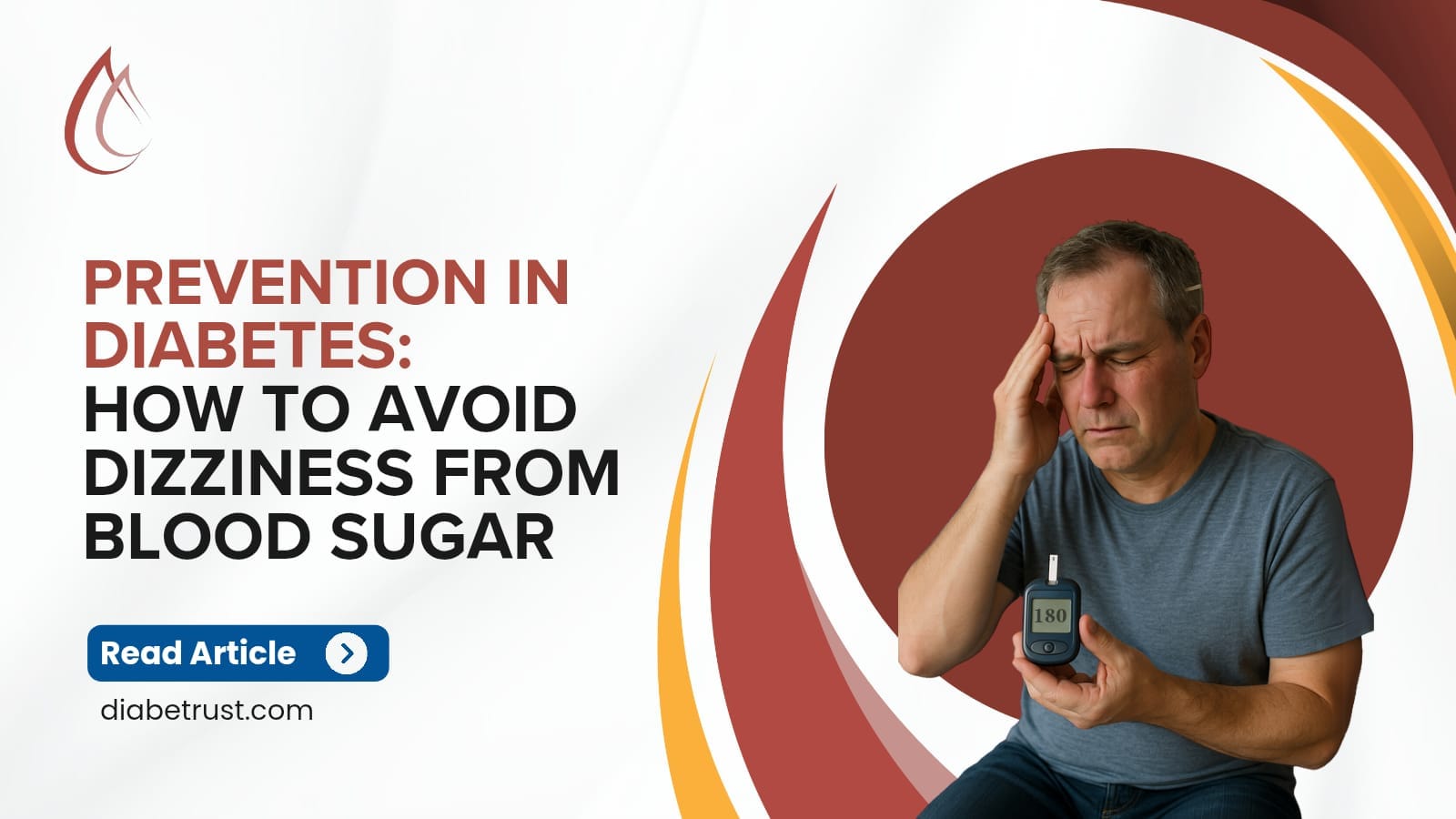Summary:
Dizziness may occur due to dehydration or spikes and drops of glucose due to certain medications. Preventive measures include monitoring blood sugar levels regularly, remaining hydrated, and eating fiber-rich, low-GI foods. Staying safe with exercises, properly taking medication, sleeping well, and managing stress can also be beneficial. These interventions help support glucose control with consequent decreased risk of dizziness and improved overall vigor. Prevention in diabetes allows for leading a healthier and balanced life while avoiding complications. Implementing these simple steps can keep dizziness at bay while maintaining stable blood sugar levels.
Prevention in Diabetes: What is Dizziness?
People describe it as a feeling of imbalance or losing one’s balance, which can have a range of feelings like faintness, weakness, a feeling of not being steady, nausea, etc., but isn’t it normal or something serious to think about?
But before that, let’s explore the reason you feel this condition. There are many reasons why you feel dizzy; it may be due to a person’s external environment or maybe because of the medications they are taking; however, the symptoms may occur suddenly without any clear reason. Prevention in diabetes helps manage dizziness occurring due to abnormal blood sugar levels, high or low blood pressure, dehydration, etc.
Prevention in Diabetes: Is Dizziness Normal or Dangerous?
Now, the next question is, is it normal to feel dizzy? The answer is yes; it’s normal to feel lightheaded sometimes without any symptoms, but if you feel regular dizziness, then it’s time to consult your doctor and share the symptoms and frequency of dizziness you feel.
Is Dizziness Something to Worry About if You Have Diabetes?
Dizziness is one of the symptoms that a diabetic patient may experience; it may be caused by many reasons, like high or low blood sugar levels, dehydration, vestibular disorder, medication side effects, and retinopathy. But dizziness is a more problematic situation because diabetes-related problems can add to episodes of lightheadedness, imbalance, and even make you faint.
Dizziness is an early symptom to really take into consideration if you have diabetes because it may lead to a lot of future problems, so if you have frequent conditions where you feel lightheaded, imbalanced, or like you are fainting, consult your doctor and share all the information as soon as possible without any delay.
Prevention in Diabetes: Why Do Diabetic Patients Experience Dizziness?

There are some of the reasons why diabetic patients feel dizziness that are stated below:
- Hyperglycemia
- Hypoglycemia
- Hypertension
- Medication
- Dehydration
- Vestibular Dysfunction
Let’s discuss each of these situations one by one for better clarity:
Hyperglycemia
Hyper (high); glucose (sugar)—the presence of glucose or sugar in the blood. It’s a condition in which the body has a high blood sugar level and is not producing enough insulin to distribute or flow the normal glucose level throughout the body
Therefore, it happens when:
- A person with type 1 diabetes does not produce enough insulin.
- A person with type 2 diabetes does not produce natural insulin to sustain the body’s regular glucose level, and the body is resistant to insulin.
This condition leads to numerous problems like blood vessel damage, organ damage, eye damage, kidney damage, and nerve damage.
Common high-sugar symptoms include fatigue, blurred vision, excessive thirst, fruity breath, nausea and vomiting, increased urination, and high appetite.
Hypoglycemia (hypo- low; glycemia- the presence of glucose or sugar in the blood)
is a condition where there is a lower blood sugar level than normal in the body, and the brain is not able to function properly because the hormones that the brain cells depend on to raise the blood sugar levels are norepinephrine and epinephrine.
When the brain doesn’t get enough of these hormones, it leads to so many complications like headaches, dizziness, blurred vision, and neurological issues.
Hypoglycemia is common for diabetic people, and it can happen due to a number of reasons, like a change in diet, medication, intake of insulin, exercise, etc.
Hypertension
Hypertension is basically high blood pressure a person is dealing with. If you have diabetes, then the probability of having high blood pressure is twice that of a normal person. Hypertension also leads to other diseases like heart disease, stroke, and other complications, and if you are a diabetic patient, the chances of having heart disease are 4 times higher than for the person who doesn’t have diabetes; therefore, it’s important to take care if you feel some of the symptoms like headache, dizziness, nosebleed, and blurred vision due to high blood pressure.
Medication
If you are a diabetic patient or any of your family members have diabetes, it is very common that the person has to take a lot of medication for a number of reasons because diabetes is just an initiator. It leads to a lot of medical problems, and due to high medications, the person feels dizziness because medication leads to lower blood pressure and potassium levels in the body.
Dehydration
Sometimes, diabetics feel excessive thirst and drink a lot of water. This condition is due to excess glucose in the body, but it’s not the problem. The problem is that your kidney is overworked and not able to absorb the glucose in the body, and the glucose starts coming out of the body through urination. This condition also pulls fluid from other tissues, which leads to dehydration.
Therefore, drinking extra water just leads to more urination, and sometimes, you feel dizzy because although your water intake is high, your body’s absorption capacity is quite low, which leads to this condition.
Vestibular Dysfunction
Vestibular disorders affect balance and eye movement. They’re basically an age disorder that affects the inner ear and starts causing balance problems as it affects the central nervous system. The chances of this problem being affected are twice as high for a diabetic person as compared to a person who does not have diabetes.
In addition, people with diabetes experience a loss of balance, dizziness, and falls. Therefore, if you are experiencing these symptoms, consult a professional.
These are some of the situations that affect a diabetic person and lead to serious issues, so if you are feeling regular dizziness, then be careful, as it may lead to a serious issue in no time.
Prevention in Diabetes: Ways to prevent dizziness:
We already discussed different situations that may be problematic for a person who is diagnosed with diabetes; now, let’s look into the treatment and prevention we could take to avoid any serious illness.
Managing diabetes regularly is the best way to prevent dizziness. Start maintaining your daily lifestyle, add a balanced diet, do regular exercise, have regular check-ups, and consult a diabetes nutritionist.
Things that come into consideration when you feel dizzy: One of the most important things to start checking is your blood sugar level, which is different for different subsets of people. For example, if you have diabetes, your blood sugar level is different, but if you do not have diabetes, you have a different blood sugar level. Some details are provided for your help:
Prevention in Diabetes: Normal blood sugar level chart:
It’s very important to understand the normal blood sugar levels in the body according to age, health criteria, and lifestyle.
The chart below shows the target blood glucose levels recommended by NICE:
| Target Levels by Type | Before Meals | After Meals |
| Non Diabetic | 4.0 to 5.9 mmoI/L | under 7.8 mmoI/L |
| Type 2 Diabetic | 4 to 7 mmoI/L | under 8.5 mmoI/L |
| Type 1 Diabetic | 4 to 7 mmoI/L | 5 to 9 mmoI/L |
| Children with type 1 diabetes | 4 to 7 mmoI/L | 5 to 9 mmoI/L |
If you observe dizziness, check your glucose level, and if your blood sugar level is not as per the chart provided, consult a professional and share all the symptoms. Healthy glucose level—For an individual who does not have diabetes, the normal glucose level in the body is different. For an individual, the range is different, given below in the chart:
Blood Glucose Chart
| Mg/DL | Fasting | After Eating |
| Normal | 80-100 | 170-200 |
| Diabetic | 126+ | 220-300 |
Source:- medkart
Therefore, if you are diabetic and feel dizziness regularly, it’s an alarm to check your sugar/glucose level in your body and consult the doctor to know what can be done as soon as possible so that it doesn’t lead to any other problem.
Also, you can go for the Hb A1c levels test. It’s a blood test that shows your average blood sugar level for the last 2-3 months. It measures how much glucose or blood sugar is attached to hemoglobin. That carries oxygen in your blood.
If you have these issues, the main adjustments you need to make are essentially to your lifestyle choices. Consult DiabeTrust to prevent any serious health problems in the future. We help you create meal plans that align with your needs and body structure. Prevention in diabetes complications is possible by adhering to these points.
Frequently Asked Questions
Q) Which is the best fruit for diabetes to prevent dizziness?
Muskmelon is a good source of fiber and bioactive compounds and is a healthy and nutritious food for people with diabetes. The fiber in muskmelon absorbs sugar from the body. It has a moderate glycemic level, around 65 GI, so a portion of 120 grams is recommended for persons with diabetes.
Q) Can turmeric prevent dizziness in diabetes?
Turmeric contains an anti-inflammatory compound that stabilizes blood sugar. It enhances blood flow and circulation and supports nervous health. Read our blog for a deeper understanding of how turmeric and diabetes are correlated.
Q) If you have diabetes, are there any do-it-yourself methods for dealing with dizziness?
A few do-it-yourself activities are mentioned below:
Drink water and stay hydrated all the time.
Focus on steady objects when feeling dizzy.
Have ginger
Have Ginkgo Biloba; it has antioxidants.
Do deep breathing exercises.
Consult a diabetes nutritionist
Q) If you have type 2 diabetes, how do you treat dizziness?
If you have type 2 diabetes and frequently feel lightheaded, it may be caused by low or high blood sugar levels or any pharmaceutical side effects. Before beginning any DIY projects or lifestyle modifications, please get medical advice as soon as possible and do as the doctor directs. Only then should you incorporate any DIY projects into your lifestyle.
 Skip to content
Skip to content



